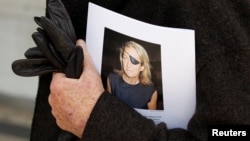Family members of veteran American Sunday Times of London correspondent Marie Colvin have filed a lawsuit against the Syrian government, claiming the government targeted her and killed her in 2012 to stop her reports about Syrian atrocities and the besieged city of Homs.
The suit claims Colvin and French photographer Remi Ochlik were killed when the Syrian government of Bashar al-Assad acted "with premeditation" when it launched a rocket attack on a makeshift media center in the rebel-held Homs district of Bab Amr on February 12, 2012. Three other reporters were wounded in the assault.
The New York-based Committee to Protect Journalists said in 2012 that Colvin and Ochlik were killed reporting on a story the Syrian government had tried to "choke off." It said their deaths represented an "unacceptable escalation in the price that local and international journalists are being forced to pay."
The Syrian Information Ministry said at the time the government did not know Colvin and Ochlik were in the country.
The civil complaint was filed Saturday in federal court in Washington by the Center for Justice and Accountability on behalf of Colvin's sister Cathleen Colvin and other family members.
The lawsuit is based on information from captured government documents and defectors. It names several Syrian officials including Assad's brother Maher.
Colvin, who was 56, was born in New York state. She earned a reputation as a courageous reporter covering some of world's deadliest conflicts for the Sunday Times, where she had worked for two decades.
Colvin wore an eye patch that concealed an injury she suffered in an explosion while covering Sri Lanka's civil war in 2001.
She acknowledged the risks of her work in a 2010 speech in which she paid tribute to other slain journalists. Speaking at London's St. Bride's Church, she said: "We always have to ask ourselves whether the level of risk is worth the story. What is bravery, and what is bravado? Journalists covering combat shoulder great responsibilities and face difficult choices. Sometimes they pay the ultimate price."
Some material for this report came from AP and AFP.





